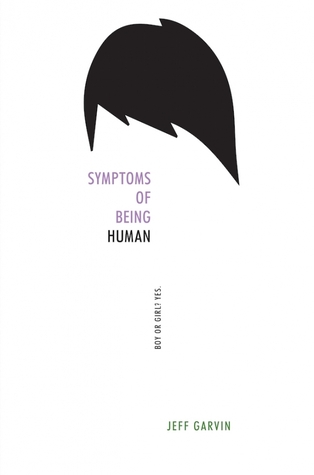Symptoms of Being Human - Jeff Garvin
On the advice of a therapist, Riley starts an anonymous blog to vent those pent-up feelings and tell the truth of what it’s REALLY like to be a gender-fluid teenager. But just as Riley’s starting to settle in at school—even developing feelings for a mysterious outcast—the blog goes viral, and an unnamed commenter discovers Riley’s real identity, threatening exposure. Riley must make a choice: walk away from what the blog has created—a lifeline, new friends, a cause to believe in—or stand up, come out, and risk everything.
Jeff Garvin is a wonderful new voice in YA fiction. His debut novel, Symptoms of Being Human, focuses on Riley Cavanaugh and their (yes, I'm using "they" on purpose as a way of avoiding gender-specific pronouns) experiences in a new school and as the teenage offspring of a high-profile politician. Riley's gender nonconforming behaviours and modes of dress are the main focus of the narrative, which leads to instances of bullying based on expectations of conformity to the norms of gender and sexuality.
Symptoms is a strong and compelling examination of gender fluidity in contrast to transgender identities and cisgender individuals. The lack of conformity to a rigid gender binary, leads Riley to suffer from feelings of insecurity and abnormality, and they seek refuge with Bec and Solo throughout the novel. Staring and feelings of intelligibility are central to Garvin's text, building on parental and peer expectations of gender conformity as opposed to understanding gender as fluid. Peers also consistently mistake Riley's non-conforming gender performance as being indicative of sexual deviance.
Though the blog posts throughout the novel sometimes feel overly didactic and more academic in tone than might be "normal" for a teenaged protagonist, the examinations of gender are effective and engaging. Riley's inner monologues are also a bid more didactic than necessary, in my opinion, but they are still very important and necessary for furthering discussion within the world of the novel. What this leads me to be curious about, however, is the intended or potential audience. I am working on a dissertation on this very subject, and I'm curious about whether these sorts of books are more for a gender fluid/trans audience that is interested in "seeing themselves" or an audience of cisgender readers that is interested in learning about the subject at hand.
In either case, the novel is poignant, smart, and sensitive. The writing itself is raw, and while the narrative does rely on homophobic/transphobic slang at times (which could be considered triggering for some readers), the text is incredibly relevant and timely. Those who enjoyed Every Day and Brooklyn, Burning will find much to love in this new binary-fracturing book about bullying, bravery, and marginalized identities.
Recommended
(Note: This review is from and Advance Reading Copy - Out Feb. 2, 2016)

Comments
Post a Comment